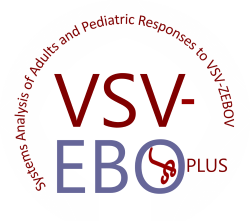The devastating Ebola outbreak that struck western Africa in 2014-2016 left over 11 000 dead, including many medical workers. The outbreak highlighted the urgent need for safe, effective vaccines against the highly infectious disease.
One vaccine that is already at an advanced stage of development is called VSV-ZEBOV (vesicular stomatitis virus – Zaire Ebola vaccine). Clinical trials of the vaccine started in Guinea, one of the most affected countries, during the outbreak. Trials have also been carried out in Europe and the US. These revealed that the vaccine is safe, generates an immune response, and offers high levels of protection against Ebola. However, researchers still have many questions about VSV-ZEBOV: How exactly does it work? How long does it offer protection against Ebola, and what influences this? And, importantly, how well does the vaccine work in children?
The VSV-EBOPLUS project aims to use systems biology approaches to decipher the molecular and immune signatures of responses to the vaccine in both adults and children in the short and long term. To do this, they will study blood samples taken from different groups, including adults and children who have just received the vaccine. They will also carry out yearly follow-up visits with two of the largest cohorts, in Gabon and Switzerland, for five years following vaccination.
The project hopes that the results will deliver novel insights into the mechanisms of action of VSV-ZEBOV, and provide signatures that can be used to accurately assess both the safety and effectiveness of vaccines.

